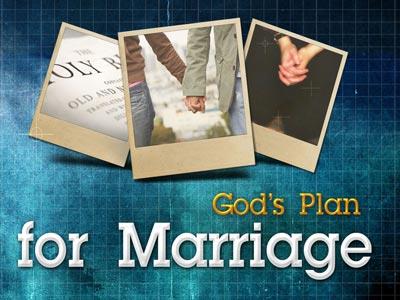-
Marriage: What It Is And What It Isn't
Contributed by Denn Guptill on Sep 22, 2003 (message contributor)
Summary: This sermon was written to clarify our view on same sex marriages in light of recent Canadian Court decisions .
If there is one issue that will define the summer of 2003 it will be the issue of same sex marriage. If you’ve been living under a rock on June 10 the Ontario Court of Appeal stated that Canada’s marriage laws are unconstitutionally heterosexist, and redefined it as:
“The voluntary union for life of two persons to the exclusion of others”.
Well that set the cat amongst the pigeons, so to speak. At first there didn’t seem to be any great cause for concern because up to this point the only federal legislation that explicitly defined marriage had been passed by parliament in 2000. The Minister of Justice purposely amended Modernization of Benefits and Obligations Act by adding the following clause in order to clarify the definition of marriage: For greater certainty, the amendments made by this Act do not affect the meaning of the word “marriage”, that is, the lawful union of one man and one woman to the exclusion of all others.
As a matter of fact the then Justice Minister Anne McLellan in parliamentary debates stated that the heterosexual definition of marriage is, “considered clear law by ordinary Canadians, by academics and by the courts. The courts have upheld the constitutionality of that definition.” She went on to say, “… again for the record that the government has no intention of changing the definition of marriage or of legislating same sex marriages.” And she concluded her remarks in the House of Commons with the following: I support the motion for maintaining the clear legal definition of marriage in Canada as the union of one man and one woman to the exclusion of all others.
The year before on June 9 1999 the Reform party put forward a resolution reaffirming that Parliament defined marriage as the "union of one man and one woman to the exclusion of all others," and called upon Parliament to "take all necessary steps within the jurisdiction of the Parliament of Canada to preserve this definition of marriage in Canada." And it passed 216 to 55.
And so it was pretty safely assumed that the traditional definition of marriage was safe, right? Wrong! Because you know what happens when you assume? That’s right sometimes you are wrong. Which brings us back to the old joke “How can you tell when a politician is lying? Their lips are moving.”
The ink hadn’t even dried on the Court of Appeals decision when Prime Minister Jean Chrétien made this statement: “We won’t be appealing the recent decision on the definition of marriage. Rather, we’ll be proposing legislation that will protect the right of churches and religious organizations to sanctify marriage as they define it.” What happened to Parliament will take all necessary steps within the jurisdiction of the Parliament of Canada to preserve this definition of marriage in Canada?
Hear now and forevermore Bedford Community Church is opposed to same sex marriages, we believe it violates the teachings of scripture and minimizes the institution of marriage and Holy Matrimony. The question then is Why? Why are we against same sex marriage? Some people would argue that we should be opposed to what is happening because a handful of judges in Ontario should not be allowed to dictate policy that is why we have a parliament and that this flies in the face of democracy. As a matter of fact this past Tuesday Stephen Harper leader of the Canadian Alliance Party stated “It is about democracy, it is about the right of the people to make social value judgments and, more
specifically, the right of judgments to be made by the representatives of the people rather than by the judges appointed by the government.”
Well maybe, but if every MP was in favour of same sex marriages along with 99% of Canadians I would still be opposed because it is still wrong.
Let’s start with Marriage: What it is.
Socially: It Protects the Family Let’s start here with some secular definitions The American Heritage Dictionary of the English Language mar•riage (mãrʹĭj) noun
1. The legal union of a man and woman as husband and wife.
Encarta Encyclopaedia Marriage, social institution uniting men and women in special forms of mutual dependence, often for the purpose of founding and maintaining families.
Collins English Dictionary mar•riage (mãrʹĭj) noun
1. The state of being married: relation between husband and wife.
Of all the definitions I read I think I enjoyed Sydney Smith’s the best, Smith was an English Clergyman who lived between 1771 and 1845 and it said “Marriage resembles a pair of shears, so joined that they cannot be separated, often moving in opposite directions, yet always punishing anyone who comes between them.”
Throughout history and cultures around the world there have been procedures and celebrations set in place that allowed a man and a woman to come together and start a family. In North America that is recognized as our modern Weddings, there is music (Link to music) that when we hear it we immediately think “Wedding” there are words that are said “Do you take this man to be your lawfully wedding husband?” that we automatically think “Wedding” there are clothes that we see them we automatically think “Wedding.” There are even automobiles that when we see them we think “Wedding.” And what we think of as normal might seem a little strange in other lands and other cultures and perhaps even in our own land a couple of generations ago. Weddings have become big business today. Sometimes when I’m talking to a couple who is living together without being married and I query them as to why their response is “We can’t afford to get married.”

 Sermon Central
Sermon Central



